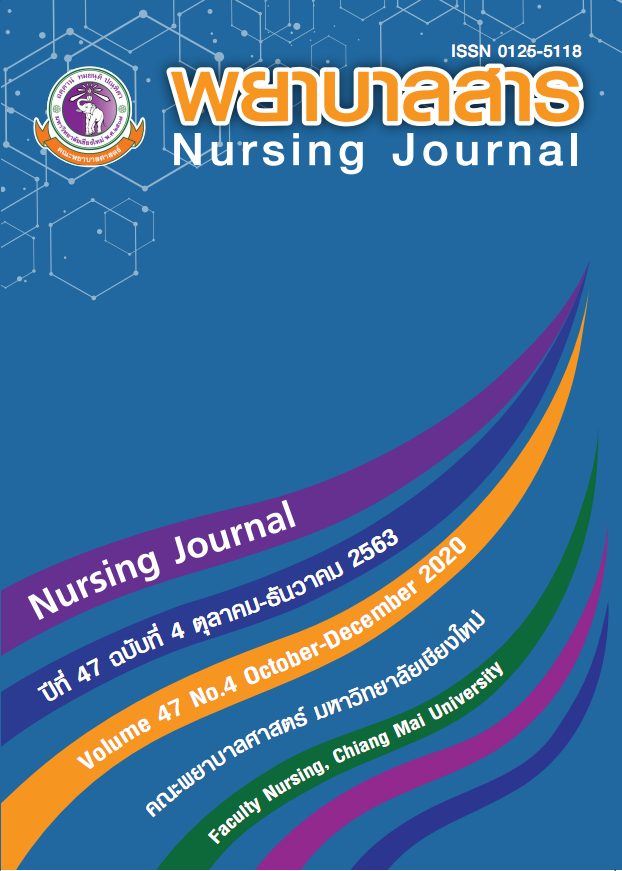Non-technical Skills of Perioperative Nurses for Patient Safety in Tertiary Hospital, Thailand
Keywords:
non-technical skills, perioperative nurses, thailandAbstract
The purpose of this research is to identity non-technical skills to improve patient safety for perioperative nurses in tertiary hospital using Delphi technique. Subjects included 27 experts from among nursing administrators in tertiary hospitals, registered nurses in operation room, doctors, nursing educators and academics. The Delphi technique consisted of 3 steps. Step 1: 4 highly experienced experts in non- technical skills were selected to describe non-technical skills for perioperative nurses in tertiary hospital. Step 2: data were analyzed and developed into a rating scales questionnaire. All items in the questionnaire were ranked by importance in non- technical skills by 23 experts. Step 3: data were analyzed using median and interquartile range which was then used to develop a new version of the questionnaire. The new questionnaire was sent to previous experts to confirm the previously ranked items. Data were analyzed again using median and interquartile range to summarize the study.
Results showed that non-technical skills to improve patient safety for perioperative nurses comprised 6 skills and 45 elements as follows: 1) situation awareness with 12 elements, 2) communication with 7 elements, 3) teamwork with 6 elements, 4) task management with 7 elements, 5) leadership with 6 elements, and 6) decision making with 7 elements.
Nurse administration can apply the components of non-technical skill to be a guideline to identify policy and platform for nursing human resource development in order to improve patient safety outcome.
References
Bogdanovic, J., Perry, J., Guggenheim, M., & Manser, T. (2015). Adaptive coordination in surgical teams: An interview study. BMC Health Service Research, 15, 128.
Dobbins, T. R. (1999). Clinical experiences for agricultural teacher education programs in North Carolina, South Carolina, and Virginia. Published Dissertation, Virginia
Edelstein, S.,Stevenson, J. M., & Broad, K. (2005). Teaching professionalism during anesthesiology training, J Clin Anesth, 17(5):392-8
Evelyn, M., Brigid, M. G., & Debbie, M. (2014). What are the non-technical skills used by scrub nurses?, Griffith University, Australia: ACORN.Flin, R. (2013). Non-technical skills for anaesthetists, surgeons and scrub pratitioners. The health foundation, 1-9.
Gillespie, B. M., Gwinner, K., Fairweather, N., & Chaboyer, W. (2013). Building shared situational awareness in surgery through distributed dialog. Journal of Multidisciplinary Healthcare, 6, 109-118.
Gordon, M., Fell, C. W., Box, H., Farrell, M., & Stewart, A. (2017). Learning health 'safety' within non-technical skills interprofessional simulation education: A qualitative study. Medical Education Online, 22(1), 1272838.
Heagsuwan, R., Chanprasit, C., & Kaewthummanukul, T. (2016). Work ability and health status among registered nurse in a university hospital. Nursing Journal, 43, 116-128. (In Thai)
Kang, E., Massey, D., & Gillespie, B. M. (2015). Factors that influence the non-technical skills performance of scrub nurses: A prospective study. Advance Nursing, 71(12), 2846-57. doi:10.111/jan.12743
Kirk, L. M. (2007). Professionalism in medicine: definitions and considerations for teaching (Proceedings). PubMed, 20(1):13-6. PMID: 17256035
Lancet, T. (2011). Medical errors in the USA: Human or systemic? [Editorial]. The Lancet, 377, 1289.
Limpanyalert, P. (2015). Engagement for Patient Safety. Retrived January 14, 2018, from http://hacc.kku.ac.th/haccupload_news/pdftitle/Tue24545uFpjMOP.pdf
McCulloch, P., Mishra, A., Handa, A., Dale, T., Hirst, G., & Catchpole, K. (2009). The effects of aviation-style non-technical skills training on technical performance and outcome in the operating theatre. Quality and Safety in Health Care, 18(2), 109-115.
Mills, P., Neily, J., & Dunn, E. (2008). Teamwork and communication in surgical teams:Implication for patient safety. Journal of the American College of Surgeons, 206(1), 107-112.
Poolpatarachewin, C. (2009). Ethnographic Delphi Futures Research (EDFR) technique. (9). Bangkok: Chulalongkorn. (In Thai)
Prati, G., & Pietrantoni, L. (2013). Attitude to teamwork and safety among Italian Surgeons and operating room nurses. A Journal of Prevention Assessment and Rehabilitation. 49(4). 669-677. doi:10.3233/WOR-131702
Phurattanakornkul, P., & Oumtanee, A. (2014). Experiences of being a perioperative nurse working in tertiary government hospital. Kuakarun Journal of Nursing, 21(1), 114-128. (In Thai)
Reason, J. (2000). Human error: models and management. British Medical Journal, (320), 768–770.
Siirala, E., Peltonen, L. M., Lundgren-Laine, H., Salantera, S., & Junttila, K. (2016). Nurse managers' decision-making in daily unit operation in peri-operative settings: a cross-sectional descriptive study. Journal of Nursing Management, 24(6), 806-815. https://doi.org/10.1111/jonm.12385
Sullivan, M., Kiovsky, R. D., Mason, D. J., Hill, C. D., & Dukes, C. (2015). Interprofessional collaboration and education. American Journal of Nursing, 115(3), 47-54.
Thatsiwat, C. (2009). Delphi Technique. Thai Journal of Public Administration. 8(1), 185-223.
Thai Perioperative Nurses Association. (2011). Competency of perioperative nurses. Bangkok: TPNA. (In Thai)
The Healthcare Accreditation Institute (Public Organization). (2018). Healthcare standard 4th edition. Bangkok: D-one. (In Thai)
Thailand Nursing and Midwifery Council. (2001). Nursing and Midwifery Standard. Retrived March18, 2018, from http://law.longdo.com/law/535/sub40058 (In Thai)
Uramatsu, M., Fujisawa, Y., Mizuno, S., Souma, T., Komatsubra, A., & Miki, T., (2017). Do failure in non-technical skills contribute to fatal medical accidents in japan? A review of the 2010-2013 national accident reports. British Medical Journal, 7(2), 1-7.
Wauben, L. S. G. L., Doorn, C. D., Wijngaarden, J. V., & Goossens, R. (2011). Discrepant perceptions of communication, teamwork and situation awareness among surgical team members. International journal for quality in health care, 23(2),159-166.
Weiser, T. G., Regenbogen, S. E., Thompson, K. D., Haynes, A .B., Lipsitz, S. R., Berry, W. R.,
Gawande, A. A. (2008). An estimation of the global volume of surgery: A modelling strategy based on available data. The Lancet, 372(9633), 139-144.
World Health Organization. (2006). The world health report 2006: Working together for health. Geneva: World Health Organization.
Yule, S., Flin, R., Paterson-Brown, S., Maran, N., & Rowley, D. (2006). Development of a rating system for surgeons' non-technical skills. Medical Education, 40(11), 1098-1104.
Yule, S., Flin, R., Paterson-Brown, S., & Maran, N. (2006). Non-technical skills for surgeons in the operating room: A review of the literature. Surgery, 139(2), 140-149.
Downloads
Published
How to Cite
Issue
Section
License
บทความที่ได้รับการตีพิมพ์เป็นลิขสิทธิ์ของวารสารพยาบาลสาร
ข้อความที่ปรากฏในบทความแต่ละเรื่องในวารสารวิชาการเล่มนี้เป็นความคิดเห็นส่วนตัวของผู้เขียนแต่ละท่านไม่เกี่ยวข้องกับมหาวิทยาลัยเชียงใหม่ และคณาจารย์ท่านอื่นๆในมหาวิทยาลัยฯ แต่อย่างใด ความรับผิดชอบองค์ประกอบทั้งหมดของบทความแต่ละเรื่องเป็นของผู้เขียนแต่ละท่าน หากมีความผิดพลาดใด ๆ ผู้เขียนแต่ละท่านจะรับผิดชอบบทความของตนเองแต่ผู้เดียว






